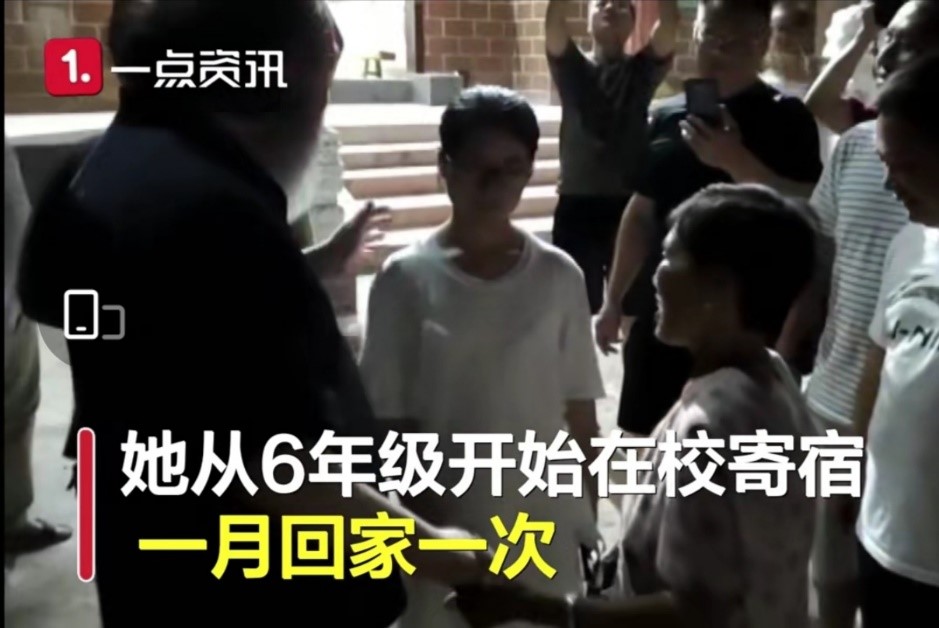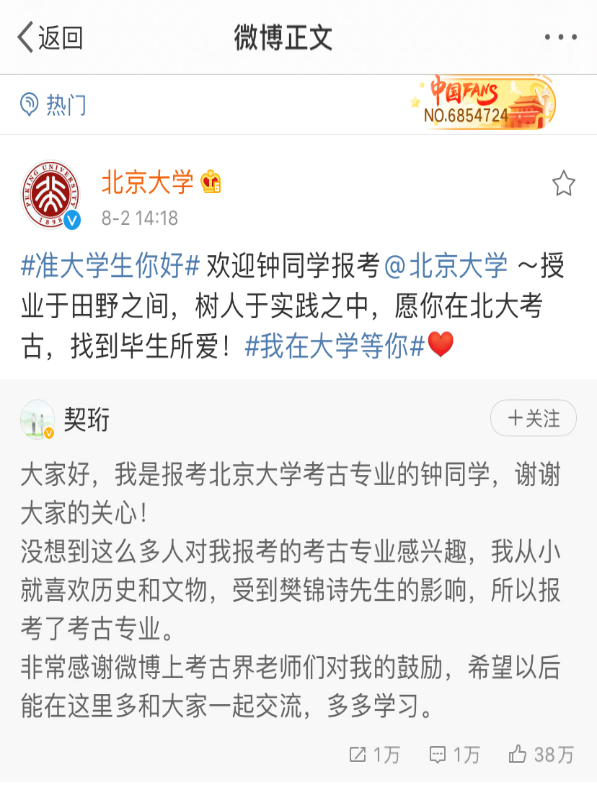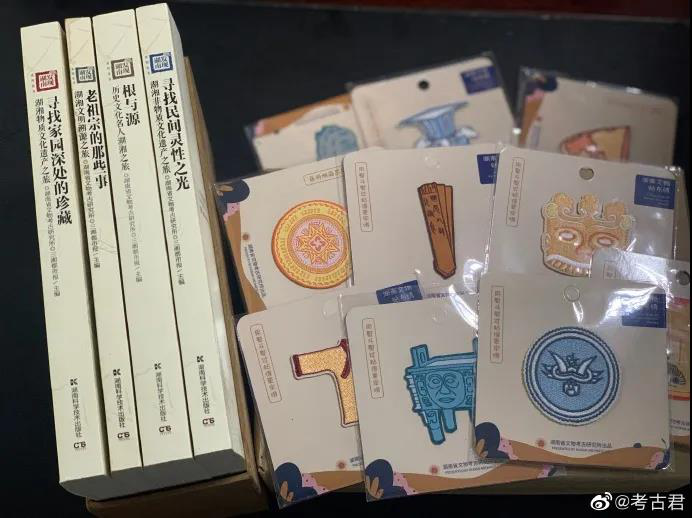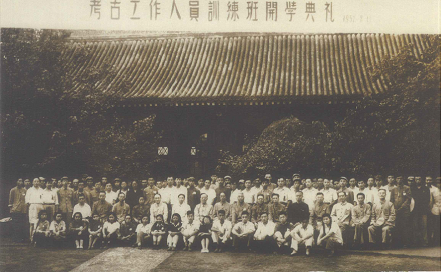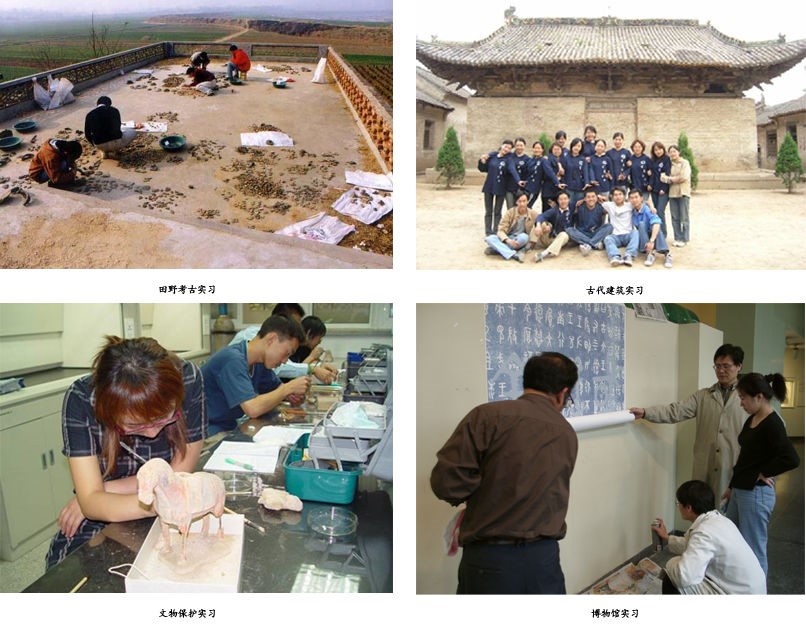Zhong Fangrong: A Hunan student with aspirations in studying archaeology at Peking University
Aug 07, 2020
Peking University, August 7, 2020: On July 23, a small village in Leiyang, Hunan province, saw fireworks light up the sky in celebration of Zhong Fangrong, an 18-year-old who came fourth among liberal arts students who sat this year’s national college entrance exam in Hunan. With a score of 676 and a wealth of majors to choose from, Zhong decided to study archaeology at Peking University. Her decision quickly made headlines and has prompted a heated discussion questioning her seemingly “unpopular” and “short-sighted” choice.
Zhong Fangrong
Braving the odds
One would be hard-pressed to guess that Zhong is part of an ever-growing community in China known as “left-behind children” whose parents worked away from home. Zhong was entrusted to her grandparents, and has lived in a boarding school since Grade 6, returning home only once or twice a month.
Zhong, armed with tremendous self-discipline and a calm, focused disposition, never lost her footing. Before the exam, an ever-independent Zhong assured her parents toiling away in Guangdong that they need not worry.
Today, Zhong’s efforts have undoubtedly paid off. Teachers and villagers alike gathered to congratulate Zhong, who was quickly branded the “pride of the village”.
A controversial choice of major
Zhong’s decision to study archaeology at Peking University quickly went viral online.
Some people noted that choosing such an “unpopular” major would only add on to her family’s financial burden and was a “waste of a chance” to turn her family’s plight around.
While some netizens were disapproving of Zhong’s choice, others quickly stepped up to support. Zhong was widely applauded for following her heart. “Being able to choose a major based on interest and work in a field you love is the most precious fortune,” one netizen exclaimed. “I admire and respect her determination in following her dream,” said another. Netizens were also quick to dispel myths about her chosen major, with one person saying, “Although not the most popular choice, it’s definitely a sensible one. Archaeology is one of the most respectable professions in China. She won’t have to worry about a job at all.”
On Sina Weibo, in response to the netizens’ concerns, Zhong shared the motivation behind her decision, “I did not expect that my choice would garner so much attention. I have had great interest in history and cultural relics since I was a little girl, and Fan Jinshi’s story has inspired me to continue pursuing my dream.” Peking University also replied to Zhong’s Weibo post, anticipating her arrival and hoping that her time at Peking University will give rise to a lifelong passion.
Peking University forwards Zhong’s post with well wishes
Nationwide support for Zhong
Fan Jinshi, distinguished alumna of Peking University, is a renowned female Chinese archaeologist who has been hailed as the “daughter of Dunhuang” for her lifelong devotion and diligent guardianship of the Dunhuang Mogao Grottoes, a national as well as international cultural treasure in Gansu province. Moved by Zhong’s story, Fan sent to Zhong her autobiography and words of encouragement. “Stay true to your heart and aspirations, and stay focused,” Fan told Zhong in a letter. Zhong quickly wrote a heartfelt reply to her idol, “I hope to follow in your footsteps, devote myself to archaeology at Peking University, and find rest for my soul.”
Many Chinese museums and archaeological institutes have also showered the young student with gifts and well wishes, welcoming Zhong into their circle.
Gifts from Chinese museums and archaeological institutes
Archaeology at Peking University
The archaeology major at Peking University ranks the first domestically. Peking University has spearheaded Chinese archaeological research and education, having been a leader in training Chinese archaeologists since the 1930s. Archaeology was set up as a university major in the PKU Department of History in 1952, which was the first educational institution for archaeology in the country. Since then, the growth of archaeological research and education at Peking University has been intertwined with the wax and wane of Chinese history.
Group photo of faculty and students of the first training class in 1952
The School of Archaeology and Museology has a strong faculty that boasts numerous renowned experts in the field, and is regarded as the “cradle of Chinese archaeologists.” Besides world-class academic expertise, it also has a holistic syllabus combining arts, sciences, theory and application. Coupled with excellent teaching and laboratory equipment across the board, graduates are well-equipped to make up the backbone of related professional circles.
Student take internships in diverse fields
The preservation and inheritance of cultural heritage, history and identity are gaining momentum and importance in modern China. Hence, a career in archaeology is not only considered as a prized profession, but also holds immeasurable value.
Written by: Li Wanqi
Edited by: Huang Weijian, Ciara Morris
Photo credit to: Sina Weibo, PKU School of Archaeology and Museology, Yidianzixun
Sources: People’s Daily, The Paper, PKU School of Archaeology and Museology

